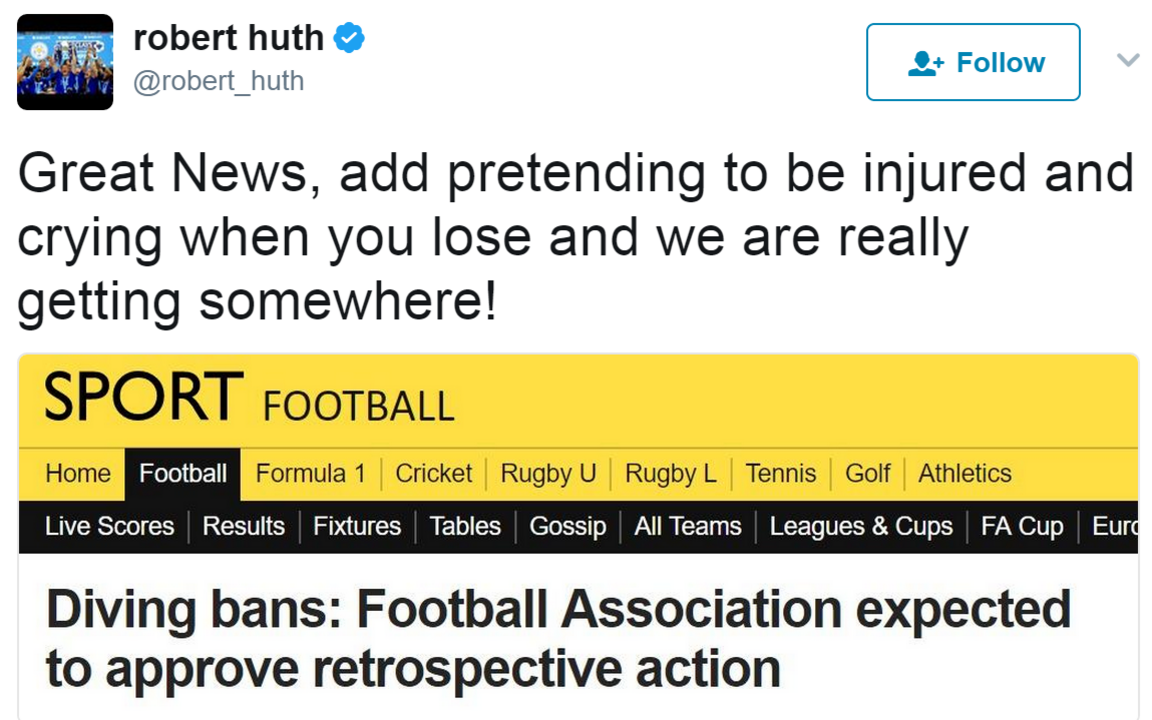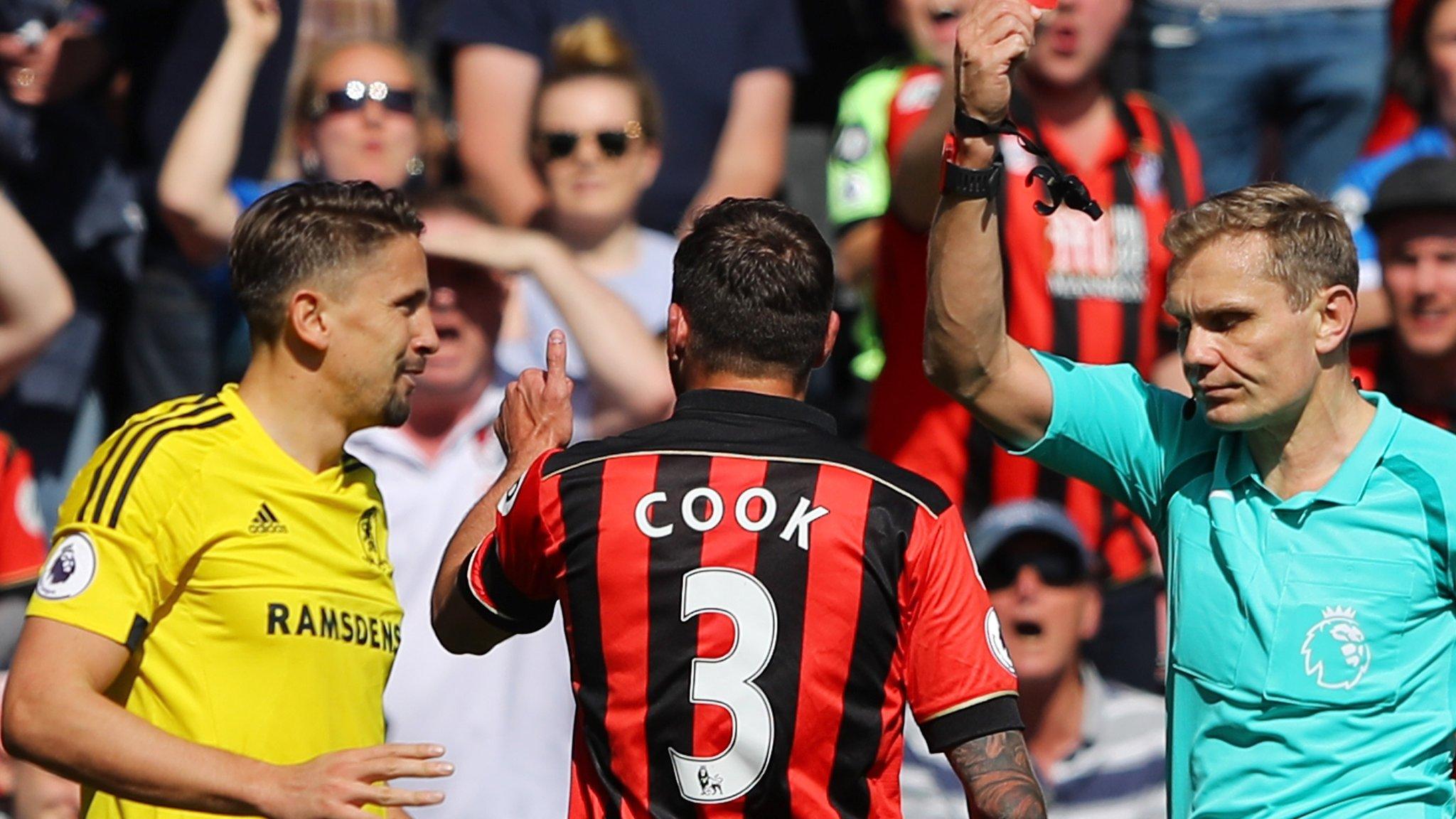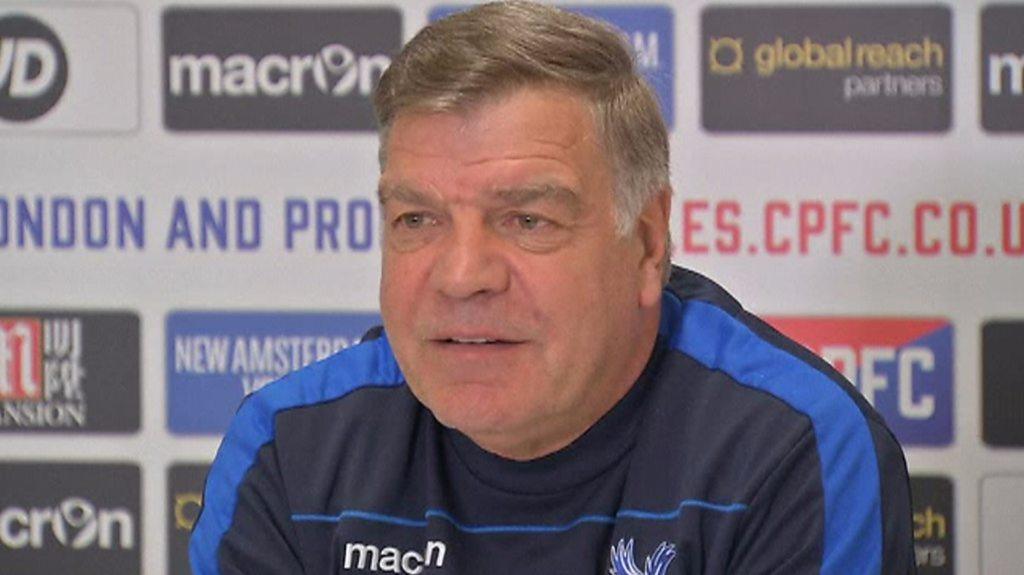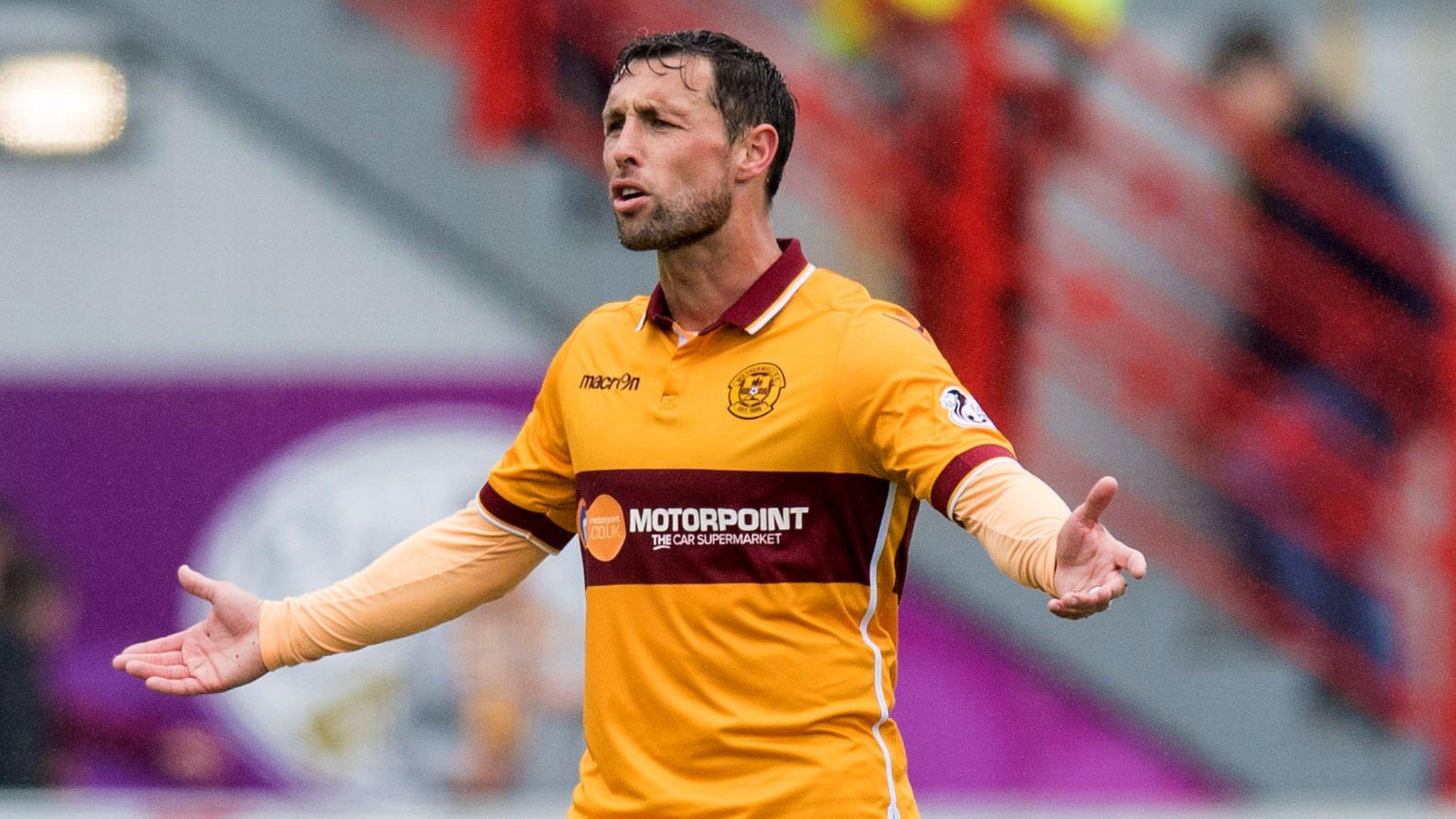Diving bans: Will retrospective action work?
- Published
- comments
How Scottish football has punished divers
The Football Association is calling it "successful deception of a match official".
Back in December, Burnley boss Sean Dyche said he thought retrospective bans would eradicate diving within six months. The players would stop doing it, if it meant risking suspension for the next two games.
From next season, under new rules announced on Thursday, a panel will review footage each Monday looking for cases - but only players who won a penalty or got a player sent off will be punished.
Will it work?
How it works in Scotland
The Scottish Football Association has had the power to retrospectively punish divers since the 2011-12 season.
Over time its rules have evolved. Now it looks not only at incidents involving penalties and red cards but anything that gives a team a "substantial advantage" - such as a free-kick scored from outside the box.
Vincent Lunny was the SFA's first compliance officer - a key role in deciding which cases warrant action.
He told BBC Radio 5 live "it would be naive to think it had an absolute effect of wiping it out".
"There are still many cases every year, and there are still many yellow cards for diving," he added.
Since the start of the 2014-15 season, players in Scotland have also been able to appeal against yellow cards given for simulation.
The first appeal, however, was only lodged the following season and in total there have been eight.
Six were upheld and the caution rescinded
Two were dismissed by the tribunal
'Good idea' - Klopp on bans for diving
Are decisions black and white?
How much of this sounds familiar?
"Silly to leave a foot in." "Naive defending." "Entitled to go down there." "The ref can't give it if you don't go down."
Motherwell's ex-Celtic and Middlesbrough striker Scott McDonald was shown a yellow card for simulation on Saturday.
He discussed the incident on BBC Scotland's Sportsound programme on Monday. One potential difficulty in enforcing the new FA rules is that - as he says - decisions are not always cut and dried.
The following is the exchange between McDonald (SM) and journalist Graham Spiers (GS).
SM: "It's not diving when there is contact, I wasn't diving."
GS: "Scott, if I get your argument right, and I've heard it from various footballers, the point you're making is if there is contact, you're entitled to take advantage of it and go down. is that correct?"
SM: "Yes."
GS: "Right, some people call that a dive. You don't need to go down…"
SM: "Let's get it right though, I'm not dragging my leg out or trying to make contact. Contact has to be made on my movement."
GS: "You don't need to go down though do you? But you take advantage of it and you do go down, so let's be clear about that as well. It's diving."
SM: "How is it diving if there is contact?"
GS: "Because you say you take advantage of it. You could stay on your feet."
SM: "So you slide in on me and you don't get the ball. I take it past you but you make contact. You want me to stay on my feet at that point. If I can?"
GS: "If it's very obvious you're diving…"
SM: (interrupts): "It's a split-second, it's not even really a decision. There will be occasions where you know you are not going to get the ball on the other side. If there is fair contact made then you're well within your rights in the law of the game to take the contact."
GS: "The nub of it is this strange phrase: 'I felt I was entitled to go down.' I find it's glaringly obvious. Why deny it?"
SM: "But let's stop denying it - you're calling me a cheat, Graham, that's the difference."
GS: "I'm not calling you a cheat."
SM: "If you're saying I dive, that's calling me a cheat, Graham. Basically that's what that is - if I'm diving, that's what you're saying. People that dive are cheats. Are they not?"
How Scottish football has punished divers
'A cancer we cannot allow to grow'
The introduction of retrospective bans for diving has received the backing of former Premier League referee Howard Webb.
The 45-year-old, who is overseeing the introduction of video refereeing in Major League Soccer, where retrospective suspensions for simulation already occur, told BBC Radio 5 live's Friday Football Social: "It is a positive move."
He continued: "We need to shift the balance. The risk/reward for players to dive is not in the right place.
"If a player is thinking 'I need to do something to try and get a point or win a game and if I hit the deck here I can get away with it and get a penalty and if I get caught I get a yellow card' that is not much of a deterrent. This new measure will be hopefully.
"It is happening here in the MLS. On a Monday morning, the disciplinary committee meet and look at all the controversial plays from the weekend and if they involve simulation then, providing the five-man panel are unanimous then that player, if he has won a penalty for his team and got a material benefit then that player will then get suspended. It works.
"Players come here knowing that if they dive and got away with it on the day they will pay the price later down the road.
"I think it was Sean Dyche who said if we introduce this it will get rid of diving in six months and lets hope he is right because it is a cancer that we cannot allow to grow."
The view from the Premier League
'Utter rubbish' - Allardyce on new diving ban
Reaction from Premier League managers has so far been mixed.
Crystal Palace boss Sam Allardyce says the plans are "utter rubbish" and called for video technology and sin-bins instead, while West Brom manager Tony Pulis embraced the idea.
"Every manager and club will say it's happened to them, but it's something we want to take out of the game," Pulis said.
"I'm pleased it's the way forward. I don't think there's any place for it in the game. I would most probably fine the players as well and give the money to charity."
Swansea manager Paul Clement echoed Allardyce's comments in saying punishment for diving should come during the game rather than retrospectively.
"It's not the answer. Video technology and looking at instant replays of major incidents are the steps that need to be taken," Clement said.
"The problem is if you're on the end of a potential dive that could cost you points, retrospective action is not going to help you and your team.
"What it can do is potentially help another team as that player could be banned for future fixtures, so I don't see retrospective bans as the answer.
"Any punishment has to be done there and then."
'Good idea' - Klopp on bans for diving

Leicester defender Robert Huth welcomed the move in this Twitter post
'It won't stop it, but it will have an effect'
BBC commentator Roddy Forsyth on BBC Radio 5 live
When the ban came in there were the same objections in Scotland as we are hearing now south of the border.
The ban doesn't make a complete difference because some players will still do it but it does now have a stigma attached to it. It hasn't eliminated diving, it never will, but it has reduced it.
Alex Schalk got a penalty for Ross County against Celtic last month, there was no contact in the box. It was amazing to all of us that the referee did not see it but his anger was such that he thought there might have been.
The television replays proved instantly that the player had dived, the penalty was given and they scored it. Schalk got a two-game ban and in the end the goal did not make a difference to Celtic's unbeaten record. But it might have done.
Then there was Kudus Oyenuga of Morton, who was sent off for a foul on Hibernian's Jordon Forster, and on the way to the tunnel he had a square-up with Darren McGregor.
The two were face-to-face, Oyenuga went down like he was shot and McGregor was sent off too. Nothing happened to Oyenuga - although McGregor's red was subsequently reduced to a yellow.
- Published18 May 2017

- Published18 May 2017

- Published15 May 2017
